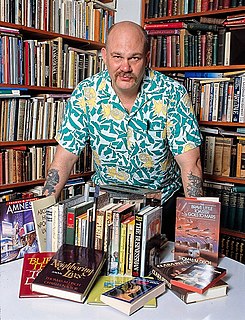A Quote by Isaac Asimov
[Social] science fiction is that branch of literature which is concerned with the impact of scientific advance on human beings.
Related Quotes
There's no real objection to escapism, in the right places... We all want to escape occasionally. But science fiction is often very far from escapism, in fact you might say that science fiction is escape into reality... It's a fiction which does concern itself with real issues: the origin of man; our future. In fact I can't think of any form of literature which is more concerned with real issues, reality.
Science fiction is the branch of literature that deals with the effects of change on people in the real world as it can be projected into the past, the future, or to distant places. It often concerns itself with scientific or technological change, and it usually involves matters whose importance is greater than the individual or the community; often civilization or the race itself is in danger.
During my span of life science has become a matter of public concern and the l'art pour l'art standpoint of my youth is now obsolete. Science has become an integral and most important part of our civilization, and scientific work means contributing to its development. Science in our technical age has social, economic, and political functions, and however remote one's own work is from technical application it is a link in the chain of actions and decisions which determine the fate of the human race. I realized this aspect of science in its full impact only after Hiroshima.
Ever since the beginning of modern science, the best minds have recognized that "the range of acknowledged ignorance will grow with the advance of science." Unfortunately, the popular effect of this scientific advance has been a belief, seemingly shared by many scientists, that the range of our ignorance is steadily diminishing and that we can therefore aim at more comprehensive and deliberate control of all human activities. It is for this reason that those intoxicated by the advance of knowledge so often become the enemies of freedom.
I do think that science fiction ideas are best expressed through visual media like film and TV. Realist literature depicts things that we have seen in life, but science fiction is different: what it depicts exists only in the author's imagination. When it comes to science fiction, the written word is inadequate.
Science fiction is the most important literature in the history of the world, because it's the history of ideas, the history of our civilization birthing itself. ...Science fiction is central to everything we've ever done, and people who make fun of science fiction writers don't know what they're talking about.
One of the dangers of science fiction, particularly bad science fiction, is that you have these scenes where the characters turn to a blackboard and start explaining how this faster-than-light drive works, or something like that. We never really have those conversations in real life. That's not part of the way we interact as human beings.
Those social behaviors which automatically preclude the building of a democratic world must go - every social limitation of human beings in terms of heredity, whether it be of race, or sex, or class. Every social institution which teaches human beings to cringe to those above and step on those below must be replaced by institutions which teach people to look each other straight in the face.
[Science fiction is] that class of prose narrative treating of a situation that could not arise in the world we know, but which is hypothesised on the basis of some innovation in science or technology, or pseudo-science or pseudo-technology, whether human or extra-terrestrial in origin. It is distinguished from pure fantasy by its need to achieve verisimilitude and win the 'willing suspension of disbelief' through scientific plausibility.

































